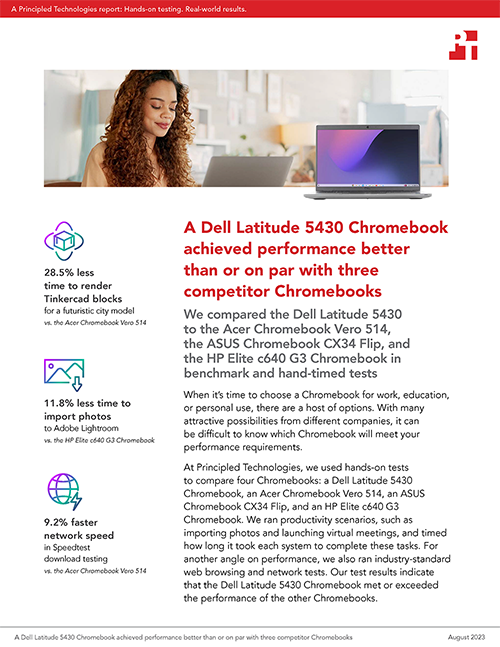
Years ago, Chromebooks had a reputation for being one-size-fits-all, buy-in-bulk devices—not the types of systems you would buy if your days involved resource-heavy tasks like 3D rendering, virtual meetings, photo editing, or intense online collaboration. Now, Chromebook technology has improved to the point that buyers can benefit from the security and manageability of Chromebooks without necessarily sacrificing the performance they need for fast-lane productivity. The question now is not whether modern Chromebooks can perform for you, but which Chromebook offers the most.
At PT, we compared the performance of four Chromebooks—a Dell Latitude 5430 Chromebook, an Acer Chromebook Vero 514, an ASUS Chromebook CX34 Flip, and an HP Elite c640 G3 Chromebook. We used benchmarks and hand-timed productivity scenarios, such as importing photos, rendering models in Tinkercad, and launching virtual meetings, to measure how long it took each system to complete these tasks. In our tests, we found that compared to the other three devices we tested, the Dell Latitude 5430 either saved time or took nearly the same time to accomplish rendering, photo, and office productivity tasks. It also delivered performance comparable to the other three Chromebooks in network and browser benchmark tests.
The Latitude 5430 also stood out by providing more ways for users to service the Chromebook themselves, potentially reducing future downtime from repairs. When looking at the whole package of performance capability, speed advantages that can add up to serious time savings, and serviceability, the Dell Latitude 5430 Chromebook has a lot to offer.
To dig into the details of our Chromebook performance comparison tests, check out the report below.
Principled Technologies is more than a name: Those two words power all we do. Our principles are our north star, determining the way we work with you, treat our staff, and run our business. And in every area, technologies drive our business, inspire us to innovate, and remind us that new approaches are always possible.






